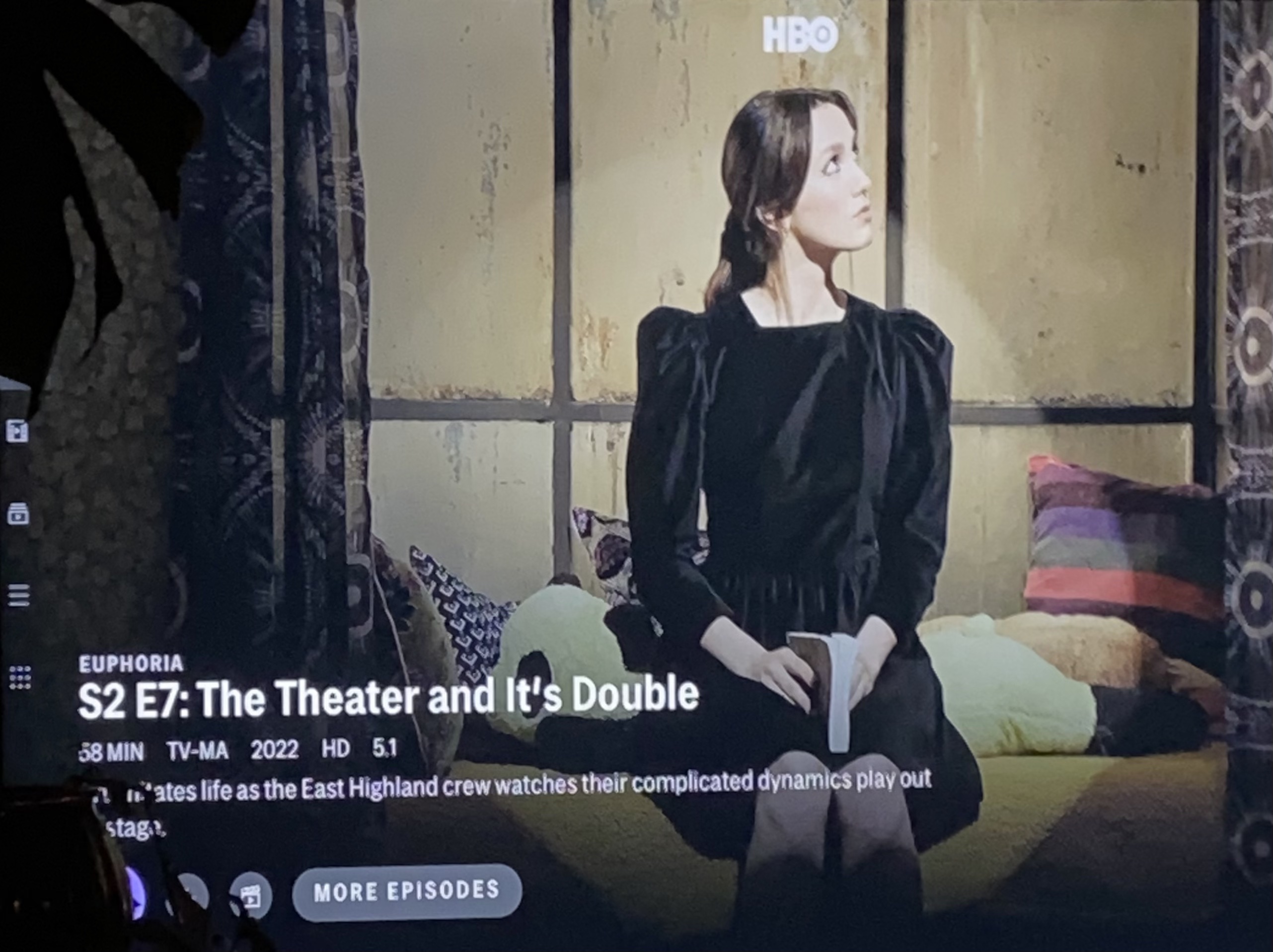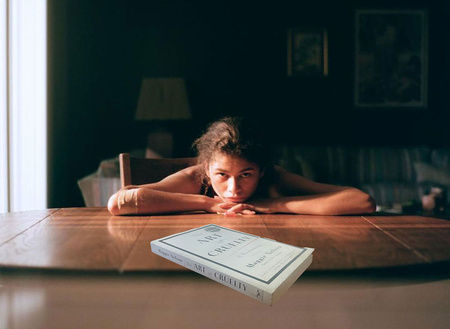Euphoria : A Reckoning
should we be forced to stomach a show that falls short in so many ways?
By Naava Guaraca
3.2.22
“The feeling that we have been violated by a work of art is compounded—and perhaps made tolerable—by the fact that we chose to experience it, come what may.”
- Maggie Nelson
Season one of Euphoria captured 2019’s new era of coming-of-age perfectly. It had all the genre’s makings: rich kids whose parents buy them alcohol, a plethora of drugs available at any given moment, traumatic childhood backstories, friendships, crushes, and love triangles. The characters were rich in their explorations of underage drinking, fleshing out their sex lives, and still getting themselves to class on time. Homework was an occasional topic of conversation. East Highland came into focus under the distilled warm glow of the camera, run by Cinematographer Rina Yang (who did Taylor Swift’s recent All Too Well short film) and Director of Photography Marcel Rév. Each episode focused on the backstory of a different character, and the intensity of each episode was led by our desire for the characters to figure themselves out whilst maintaining a level of care for one another. For anyone who hasn’t seen the show, here’s a cheat sheet I made:
While care felt readily present in season one, it was the first thing to fly out the window in season two. Watching Euphoria is a different experience in the early months of 2022: violence and sadness are abundant onscreen, and it leads to an experience that, when coupled with the atrocities of everyday life, feels thoughtless and unnecessarily cruel. Rue (Zendaya) is recently addicted to heroin and fetanyl, a dream of hers realized by a shady interaction in which she talks a highbrow drug dealer into giving her a suitcase containing $10k worth of drugs. She’s supposed to sell them, of course, but instead starts taking them with new friend Elliot (Dominic Fike). Her girlfriend, Jules, is adeptly focused in the other direction, forming friendships with the other girls and eventually cheating on Rue with Elliot himself. As Rue falls further into her addiction, we struggle to maintain our empathy for her. In a statement posted on instagram, Zendaya says: “It’s my hope for people watching that they still see her as a person worthy of their love. And worthy of their time, and that she has a redemptive quality still, and that we still see the good in her even if she can’t see it in herself.”
In her fantastic performance throughout season two, Zendaya has us convinced: we care for Rue and hope for her safety the way she does. But I wonder about the care writer/director Sam Levinson himself has for Zendaya, not to mention his other actors. In the days following the release of episode five, wherein we experienced Rue’s addiction come to a startling head (screaming match with her mom, Temple Run-style police chase about town, her ending up locked in a drug dealer’s house being watched by a man with a gun), Zendaya posted a slew of Instagram stories from her phone’s camera roll:
First photo reads: Still got this damn scar from that damn door lol
Second photo reads: The love you need between takes @hunterschafer
Third photo reads: Rue really be whoopin my ass
This violence crosses a line into uncharted territory for Euphoria. The actors have now suffered through something they seemingly weren’t expecting in order to film this episode; they had to hold one another between takes because the content was so suffocating, so horrifying, they couldn’t bear to withstand it alone. In these moments, writer/director Sam Levinson has accomplished something so wickedly cruel: he’s created a leading character onto which he can expel the anger he once felt as an addict. She’s a vehicle for his experience, which doesn’t match the character he’s created. Rue is neither white nor male, nor is she a fully-fledged adult. We hope to continue to experience the realities of her life as a teenage girl the way we glimpsed it in season one, but season two has stripped her entirely of any character.
There’s a certain level of overt violence that we’re not conditioned to be able to stomach as humans. In Maggie’s Nelson’s The Art of Cruelty: A Reckoning, she examines the construct of cruelty as a tool utilized in contemporary art. But at the center of the book lies the question: is cruelty a necessity? She writes:
“The distillation of long, complex stories and situations to 2-inch-high, four-minute snippets is, in my experience, an exceptionally poor means by which to contemplate the horrors of human trafficking, child prostitution, landmines, and the like.”
Levinson’s writing has surpassed the point in which we’re able to understand Euphoria as a mere coming-of-age story. I was reminded of Maggie Nelson’s words as I watched Rue get shot up with morphine by the drug dealer to whom she’s indebted. As I watched her wake up the next morning in a house surrounded by gun-toting men, I wondered: is she about to be human trafficked? Is she going to be sold into prostitution? A few weeks ago I was contemplating the hopeful promise of finding out if Maddy and Nate were still dating. Instead, we watch as Nate holds a gun to Maddy’s head in threat of shooting himself should she not return his stolen pornographic CD. For sixty minutes every week, we fear for their lives.
Both the story and characters have been pushed to an insufferable breaking point: where they used to be fun and explorative in their daily lives, we now watch them suffer as a product of their own experimentation. It’s gone too far for everyone. Rue is hooked on fentanyl and hurting the people around her one by one. Cassie has slept with her best friend’s boyfriend one too many times, and even throws up in a hot tub surrounded by her friends due to a combination of drinking and embarrassment. Yet none of these characters express the shame that we’d expect of a teenage girl. Each new episode feels like it’s trying to outpace the previous one in terms of how terrible it can get for these characters’ lives.
And listen, I watched Skins UK at the ripe age of 12. We’ve all seen coming-of-age stories wherein characters make questionable decisions that were written and performed well (think: Booksmart, Moonlight, Sex Education, Freaks and Geeks, etc etc). Levinson’s desire to overly demonize his female characters is a new level of cruelty that initially feels easy to overlook because it’s something we’re all too used to. The unreliable female narrator is a trope common within the genre of fear, and one of the first things we learn about Rue, our narrator, is her history of addiction. We never really find out who she is outside of this, but we distrust her because we understand her as a person predisposed to “bad decision-making.” At every moment, she’s hellbent on finding a fix, a truth that equates to an addict, but doesn’t equate to the soul-searching introspection of a teenage girl. Levinson’s characters act as products of his own experience with addiction, but they don’t exist independently of him.
This all precedes the consideration of the male gaze, which feels inherently central to the show’s existence. The women are always wearing clothes made to accentuate their bodies, a fact only made creepy when you remember Sam Levinson found Faye (Chloe Cherry) while browsing Instagram, and Cassie (Sydney Sweeney) had to beg Levinson to cut several topless scenes. It feels as though Euphoria’s creation is nothing but a means to satisfy Sam Levinson’s own sexual desires. In episode eight, as Sweeney stands under the stagelights of Lexi’s play, one audience member shouts: “show us your boobs!” A moment of comedic relief is rendered unfunny when considering the almost entirely male-led set and male-written script.
Luckily for these characters, there’s one redeeming quality. Where the writing falls short, the actors shine. As Evan Ross Katz writes for The Cut, “If the plots can be far-fetched, it’s the stars who ground them, shading their storylines with levity and vulnerability.” The girls bicker and mix drinks together, they occupy spaces in such a way that we understand them as family. On set, they’ve built relationships with one another that just barely manage to shine through their flat characters. The filming itself is beautiful: every street Rue runs down feels like another one of the same in sweet, sweet suburbia, with houses built close together and the sky always turning toward dusk. This is thanks to Rina Yang, who relies heavily on the orange/blue color contrast that glows like night and feels inherently Gen-Z in its creation (think Petra Collins, Lauren Tepfer, etc). And sometimes the scenes are so gorgeous that I want so badly for this to be enough. The high production quality and season two’s Kodak Ektachrome keep us hooked. When the final episode aired, HBO Max actually broke, refusing to load for those of us desperately trying to tune in. Week after week we’ve continued to stand strong in our unwillingness to look away from the mess that has become Euphoria.
I can’t help but mention this insane typo (it’s vs its), which has since been changed on the episode’s title page:

Maggie Nelson asks: “Is there any space left for not watching, not focusing, not keeping abreast of all the events and atrocities unfolding in the world, as an ethically viable option?” This to say, I wish there was a humanly viable way to watch Euphoria. As Katherine Singh writes for Refinery29, “They’re tough scenes to watch—and I watch them all, mostly through my fingers with my heart racing and a lump forming in my throat.” I came for Rue and Jules and their queer friends-to-lovers plotline; I stuck around for Maddy and Cassie doing molly and then riding the carnival’s carousel. What began as fun, dark humor has reached a horrific limit that as viewers we can’t seem to look away from. And I worry our captivation has fallen into the hands of someone who doesn’t know how to balance it gently.
With season two done and wrapped, I feel like I'm in a staredown with Sam Levinson and I can't tell which of us is winning. On one hand, I rue the day (ha ha) that I have to seriously process the atrocities I've seen performed by these characters who do not deserve to suffer at the hands of bad screenwriting. As a girl in her mid-twenties suffering through 2022, I spend most of my days craving gentleness. I dream of scenes where the Euphoria characters have conversations about their drama that don’t end in someone publicly shame-spiraling. I envision them driving their parents’ cars—sober—right on into senior spring. I can see Ashtray and Elliot, the two face-tattooed characters, shooting the shit on Fez’s couch. And maybe there does exist a world in which every one of these passionately juvenile scenes happens. Maybe I’ll just have to write it myself.

